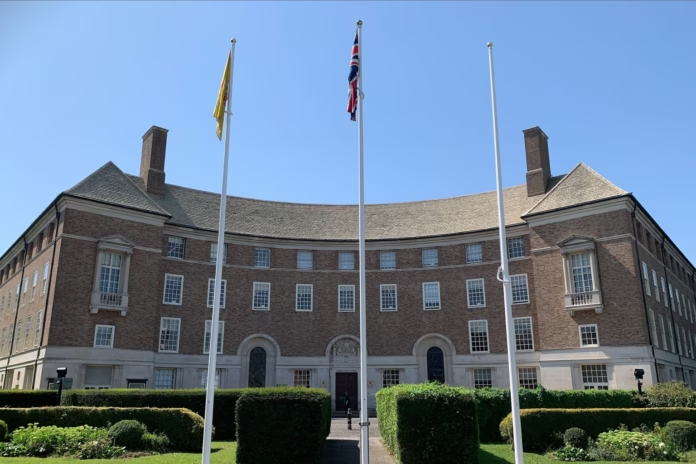
Brendan Arnold, interim director of finance and section 151 officer at Woking Borough Council, has issued a section 114 notice in response to the “unprecedented” financial challenges facing the authority. But how has a relatively small council in Surrey got into such deep financial trouble?
In a review of the council’s financial affairs, Arnold – who has been in the role at Woking since 1 March – identified a range of key issues. These are outlined below.
The business model
Over a long period of time, Arnold said, Woking Borough Council has been using a business model that incorporated a 50 year payback period and has used assumptions that “inevitably entailed that the companies used for asset construction and ownership would return accounting losses over a long period of time”.
The council – having insufficient revenue resources to fund these operating losses – has chosen to fund them by advancing monies sourced from loans supplied by the Public Works Loans Board (PWLB), he noted. Reflecting the business model used, loans have been advanced to the council’s companies for capital purposes and revenue purposes. Where the loans have been used for revenue purposes, this practice falls outside Regulation 25(1)(b) of the Local Authorities (Capital Finance and Accounting) (England) Regulations 2003, Arnold said.
The debt portfolio
Woking Borough Council has been setting aside insufficient monies for the repayment of debt, Arnold noted. The council’s debt portfolio is £1.8bn as of 31 March 2023, and the Minimum Revenue Provision to repay debt “appears to have been undercalculated since 2007/08”. This will result in additional charges to the revenue account in the region of £95m in 2023/24, and an average in the region of £75m in each year moving forward.
As a result of this under-calculation, the opening balances in the historic suite of final accounts at 1 April 2018 will need to be re-stated by c.£80m and prior period adjustments totalling £220m made to the financial accounts prepared by the council for the years from 2018/19 to 2022/23, Arnold pointed out.
The under provision for repayment of debt also affects the council’s Medium Term Financial Plan (MTFP), which will face additional charges in each year moving forward.
“In order to explain the impact, if the additional charges of c.£75m in each year were to be funded by service reductions, this would mean that the council could no longer afford to provide any services at all and would still see a net budget shortfall,” Arnold said.
The impact of loans
The council has passed the majority of the loans drawn down from the PWLB to various of its companies, equating to £1.3bn in total. The most significant of these companies being Victoria Square Woking Limited (VSWL) and Thameswey Group Limited (TL). Most of these loans were applied for capital purposes, which Arnold noted was correct procedure, but a significant proportion – up to c.£160m – is likely to have been used to fund revenue expenses, which is not in accordance with Regulation 25(1)(b) of the Local Authorities (Capital Finance and Accounting)(England) Regulations 2003.
If loans were advanced for a revenue purpose these should have been treated as revenue expenditure in the council’s accounts rather than funded from borrowing, Arnold noted. This raises the prospect of a corrective charge.
Diminishing asset values
The majority of the assets created by the Investment Programme that has been in delivery over a number of years lie within the accounts of the council’s companies, some of which are joint owned with commercial parties. These assets have been re-valued by experts in the field, Arnold said, and “it is clear that asset values have diminished substantially over time and further valuation work will be required to bring these values up to date”.
The loans advanced by the council to the various companies therefore need to be adjusted to reflect impairment of the underlying assets in a sum exceeding £600m. This has an adverse impact on the security available to the council in terms of the loan advances made, Arnold said.
Insufficient funding streams
The core funding of the council in financial year 2023/24 – comprising council tax, business rates and government grants – is just £16m. The size of the debt portfolio acquired by the council – £1.8bn – is therefore hugely out of step with the funding streams available.

Unbridgeable budget shortfalls
Arnold also noted that, aside from the above, the council is already facing a ‘business-as-usual’ budget shortfall of £9m in financial year 2024/25 and thereafter. This shortfall has arisen from a deterioration in the performance of its acquired assets against the original commercial targets as a result of economic factors (including general inflation, energy inflation, reduced parking revenues owing to homeworking, and moderated high street spending through internet shopping).
This shortfall is likely to increase as additional pressures are identified at the next update of the MTFP. In addition, the repair and maintenance budget is estimated to be insufficient by £45m per annum based on the value of the council’s asset portfolio at 31 March 2021 and industry benchmarks for repair and maintenance budgets. Overall, the balancing of the 2024/25 budget will result in “very significant” reductions in both budget and service levels, Arnold said.
Arnold concluded that the existence of all these factors rendered the forward budget shortfalls “unbridgeable”. There is “no prospect” that the council will balance its budget in 2023/24, 2024/25 or the successive years “without external intervention on a very large scale”, he said. “On this journey, the enriched service suite that the borough has enjoyed over a number of years will need to be removed or alternative funding sources found,” he added. “In this regard, work has been underway for some months to bring forward proposals to offset the £9m budget shortfall – as adjusted by additional cost pressures – already identified.”
No cash reserves
When the overall deficit complicit is calculated, and because calculation of the charge for Minimum Revenue Provision entails a suite of prior period adjustments in the financial accounts for years past, the council presently has an estimated negative general fund balance of c.£350m as at 31 March 2023, Arnold reported. The negative value of the general fund at this date is forecast to more than triple to around £1.20bn by 31 March 2024. In order to resolve this position the council will need a commensurate injection of cash or removal of liability, he said.
Arnold noted that at the date of his report (7 June), the council was working towards definition of the revenue outturn position for 2022/23 against budget. “It is considered likely that an overspend will be identified,” he said, for the reasons set out above, and he noted that “there are in reality no cash backed reserves available to fund this overspend because the General Fund balance is negative”.
Conclusion
It is clear, Arnold said, that Woking Borough Council “cannot meet these very large costs from its own resources”. The only way forward is therefore to open discussions with the Department for Levelling Up, Housing and Communities (DLUHC) “on the provision of financial support from government”.
As s151 officer, Arnold will now monitor the council’s response to the notice “on an ongoing basis to ensure that sufficient action is taken at pace to address the issues identified”. He added: “If I am not able to see satisfactory progress, I will consider the issuing of a further section 114 report. It is also the case that an inability to agree financial support from government may inevitably lead to further section 114 reports being laid before council.”
—————
FREE weekly newsletters
Subscribe to Room151 Newsletters
Follow us on LinkedIn
Follow us here
Monthly Online Treasury Briefing
Sign up here with a .gov.uk email address
Room151 Webinars
Visit the Room151 channel













